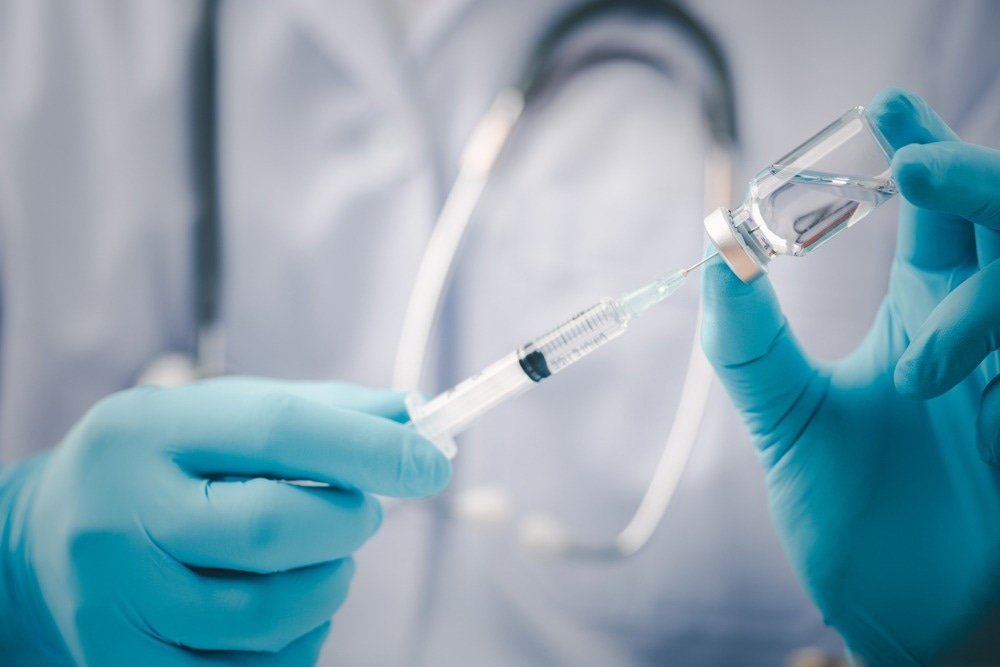In a recent study published in PLOS Medicine, researchers determined the vaccine effectiveness (VE) of the primary coronavirus disease 2019 (COVID-19) vaccination series. They determined VE against severe acute respiratory syndrome coronavirus 2 (SARS-CoV-2) reinfection, COVID-19-related hospitalization, and mortality. In this way, the researchers assessed the effect of time since vaccination during the predominance eras of different SARS-CoV-2 variants, viz., Alpha, Delta, and Omicron.
 Study: Vaccine effectiveness against SARS-CoV-2 reinfection during periods of Alpha, Delta, or Omicron dominance: A Danish nationwide study. Image Credit: LookerStudio/Shutterstock
Study: Vaccine effectiveness against SARS-CoV-2 reinfection during periods of Alpha, Delta, or Omicron dominance: A Danish nationwide study. Image Credit: LookerStudio/Shutterstock
Background
In Denmark, the government provides free COVID-19 testing, vaccines, and medical care to all its residents. They rolled out the COVID-19 vaccination program in December 2020, prioritizing the elderly and people at high risk of severe disease. Likewise, they started a booster vaccination program in September 2021.
Scientific data points to the reduced effectiveness of COVID-19 vaccines against the Omicron (B.1.1.529) variant. Studies have also shown that natural immunity more effectively protects against SARS-CoV-2 reinfections than vaccination. Thus, it is in the public health interest to examine the additional benefits of vaccination (if any) among individuals previously infected with SARS-CoV-2.
About the study
In the present study, researchers compiled data from four nationwide resources, the Danish Civil Registration System (CRS), Danish Microbiology Database (MiBa), Danish Vaccination Registry (DVR), and Danish National Patient Registry (DNPR).
Combined with a unique personal registration number of a Danish citizen, this data helped them identify people with a confirmed SARS-CoV-2 infection between 1 January 2020 and 31 January 2022. Likewise, they obtained each SARS-CoV-2 variant's dominance periods using CSR data, defined as the period when a variant accounted for 75% or more of all whole genome sequenced reverse transcription-polymerase chain reaction (RT-PCR) tests. Additionally, the team investigated COVID-19-related hospitalization up to 14 days after or 48 hours before SARS-CoV-2 reinfection and death within 30 days of reinfection.
In statistical analyses, they included gender, comorbidity, and country of origin as categorical variables, while age and hospital stay duration as time-varying covariates. The team used a quasi-Poisson regression model to estimate crude incidence rate ratios (IRRs) and a Cox proportional hazards regression model to estimate hazard ratios (HRs) adjusted for all variables before and in the respective periods after vaccination. Finally, they calculated VE crude (VEcrude) and adjusted (VEadjusted) as a percentage using IRR and HR values.
Study findings
The study population comprised 209,814, 292,978, and 245,530 individuals infected before or during the Alpha, Delta, and Omicron predominance eras, respectively. Of these, 19.2%, 64.9%, and 64.6% of people had received their COVID-19 primary vaccination during the Alpha, Delta, and Omicron periods, respectively. The primary study finding was that previously infected individuals also benefited from COVID-19 vaccination during all three variant periods, data crucial to inform policymakers plan future vaccination strategies.
In the Alpha-dominated period, the VE was not statistically significant. It peaked at 71% at 104 days or more after vaccination with any COVID-19 vaccine type. However, the VE against reinfection was highest between 14 and 43 days after the primary vaccination series in the Delta (94%) and Omicron (60%) periods. Though lower than for other variants, the researchers noted an initial VE of 60% against reinfections even during the Omicron period. These results are consistent with findings of a Qatar study showing a VE of 55.1% against reinfection with Omicron after two doses of a COVID-19 mRNA vaccine.
Since older and more vulnerable people received SARS-CoV-2 vaccination on priority. These individuals mounted a slower immune response following vaccination, explaining why the observed VE was statistically insignificant during the Alpha period. Moreover, all 65 years or older individuals experienced more severe outcomes than SARS-CoV-2 reinfections in other age groups, overall and within the same variant period.
Another intriguing finding was that the risk of COVID-19-related hospital admission during the Alpha period was higher for vaccinated vs. unvaccinated individuals (IR: 0.002 vs. 0.001). Perhaps even before the rollout of vaccines, several long-term care facilities (LTCF) residents had already contracted SARS-CoV-2 infections. Because the hospitalization and death events due to COVID-19-induced complications were too few in the present study, the researchers could not estimate VE for the same.
The completeness of the Danish registry data likely removed all unmeasured biases that might have impacted the study results. However, studies with longer follow-up times could ascertain VE against severe COVID-19 outcomes in those with prior infection.